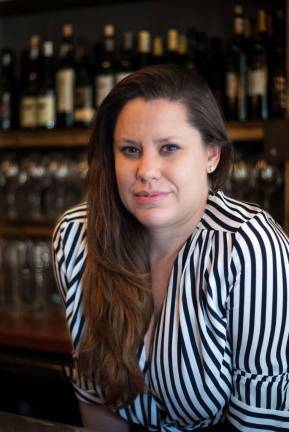Wine - and Charity - from South Africa

Upper East Side's Kaia Wine Bar holds fundraiser for medical organization When Suzaan Hauptfleisch first came to the U.S. in the winter of 1995, she trudged through the snow with flip-flops on her feet and $80 in her pocket. Hauptfleisch, who was born and raised on a farm called De Hoop in the Free State Province of South Africa, had never before seen snow in her life. She spent the next 17 years working in restaurants while trying to make it as an actress, all the while dreaming of opening up an authentic South African restaurant of her own. In March of 2011, after falling in love with the perfect vacant space at 1614 3rd Avenue-and calling in a whole lot of favors-Kaia Wine Bar was born. "We needed something like this in the neighborhood," said the 35-year-old Hauptfleisch, who lives on the Upper East Side with her black pug, a rescue dog named Lola. "Up here, it's all bars or Italian or French. I mean, there's three Mexican restaurants within a two block radius of where I live." The South African-themed wine bar, whose name roughly translates to 'home' from the Zulu word 'eKhaya,' serves seasonal South African small plates, meats, cheeses, craft beers and New World wines. The menu is seasonal, and, according to Hauptfleisch, is the only South African restaurant in New York City that actually has a South African Chef at the helm. Both she and Chef Ivan Giani are from the Free State. "Growing up, we ate what the earth gave us and pickled things to keep us going in months of scarcity. For white farmers, we were very, very poor. Life was tough and my dad would kill many a livestock each week just to feed us and those who worked for him," Hauptfleisch said. Her mother, Elize, works in the kitchen for five months out of the year, leaving her "thumbprint" in all of the chef's dishes. Last week, on Thursday, August 29th, Hauptfleisch held her first fundraiser to help raise money for Phelophepa, a volunteer organization that delivers much-needed medical supplies and bio-medical services to rural communities in South Africa. "Because Apartheid hospitals were segregated, my mother was often the doctor, nurse, and midwife to the black folk living and working on our farm," she said. "Often, in severe medical cases, my dad had to rush to the nearest segregated hospital and fight to get somebody who worked for us admitted, even if they were very sick." Phelophepa's eighteen-car train travels throughout South Africa to deliver cataract surgeries, reading glasses, dental and psychological care to those in need, and provides outreach programs including HIV/AIDS education, to children. "Most hospitals in rural South Africa are few and far between. If we had a train like Phelophepa back when I was growing up?what a difference it would have made," Hauptfleisch said. Kaia, which serves sustainable fish and bio-dynamic, grass fed, organic meats, has seen extraordinary support from the local community, with some neighborhood regulars stopping in every single night of the week. Her local work isn't done, though?she's currently trying to lobby for a local farmer's market across the street from her restaurant. "I always have to carry bags of fresh produce uptown from the Union Square Market because we don't have one on the Upper East Side," she said. "I've been talking to the city and the board of the buildings at Ruppert Towers, so hopefully we can get that done."